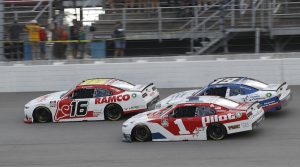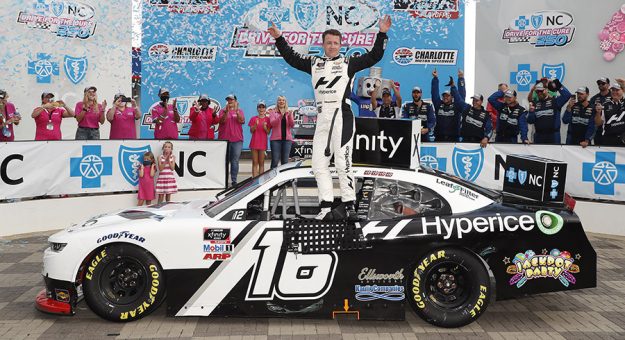At some point in 2020, A.J. Allmendinger’s wife, Tara, had a novel suggestion.
“We need to get a new trophy case,” Allmendinger told SPEED SPORT in October.
This didn’t sit right with the Kaulig Racing driver, who entered 2020 with a single NASCAR victory during the previous five years.
“I felt like that was bad superstition,” said Allmendinger, who replied to his wife with “We’ll be fine.”
Fast-forward a year.
A few hours after recounting that story, Allmendinger won the NASCAR Xfinity Series night race at Bristol (Tenn.) Motor Speedway, taking the checkered flag while crashing during an overtime finish.
It was the 39-year-old’s fourth Xfinity Series victory of the season and his fifth NASCAR triumph of the year for Kaulig Racing, following his Cup Series win on the Indianapolis Motor Speedway road course in August. Weeks later, he earned his fifth Xfinity Series triumph of the campaign at the Charlotte Motor Speedway ROVAL.
Entering the Nov. 6 Xfinity Series finale at Phoenix Raceway, Allmendinger had a legitimate chance to win a championship. He was enjoying his best racing life.
“It’s kind of good,” Allmendinger said. “We need a new trophy case.”
It all started in California, the point of origin for Jeff Gordon and Kyle Larson.
In-between those two generations of drivers came Allmendinger.
Born and raised in San Jose, his father, Greg, was a lifelong carpet layer and local dirt-track racer. His mother, Karen, worked “a lot of different jobs,” including in communications and as a medical assistant.

“My parents weren’t rich by any means,” Allmendinger said. “They mortgaged their house three times to keep me going racing. … All the money went into racing. … We were always at my dad’s races. … When I was 5 years old, it was time for me to start racing.”
Allmendinger, whose favorite motorsport then and today is motocross, went bicycle racing for three years. At age 8, he wanted to start racing motorcycles.
“My mom was like, ‘Hell, no, that’s not happening. You’re crazy,’” Allmendinger recalled.
Instead, he went with quarter midgets. That began a motorsports trek that has ranged far and wide. He won in ChampCar, competed in the 2013 Indy 500, won the Rolex 24 At Daytona (2012) and claimed two underdog NASCAR Cup Series triumphs seven years apart.
There were plenty of valleys, too. He had a DUI charge during the 2009 season and was suspended after testing positive for amphetamines in 2012. That led to “dark days” for Allmendinger before he began the climb back with Phoenix Racing and JTG Daugherty.
Through it all, his racing pursuits have never been solely about money.
“People thought I left (ChampCar for NASCAR in 2006) because ‘there’s more money in NASCAR, etc.,’” Allmendinger said. “I loved ChampCar. I enjoyed it so much.”
With the looming reunification of Indy car racing, “ChampCar was dying,” and his owner, Jerry Forsythe, “hated Tony George, he hated the IRL. He made it very clear, he wasn’t going to IRL.”
Allmendinger also wasn’t wild about the idea of racing Indy cars on ovals.
“As weird as that sounds since I went to a series that raced mostly on ovals, Indy cars on ovals scared me at times,” Allmendinger said.
Jump forward a few years. Past Allmendinger’s NASCAR Truck Series debut at New Hampshire in a backup truck that was previously a Bill Lester show car. Beyond the few years where he “floundered and hung on” in a doomed Cup Series pairing with Red Bull Racing.
In 2009, he latched on with Petty Motorsports and finished third in the Daytona 500, changing the team’s plans drastically.
“We were only supposed to do five or six races,” Allmendinger said. “I literally gave back every cent that I made from those races through the first three quarters of the year because that was the only way to help keep the car going. Anytime I was getting prize money, and especially back then the prize money wasn’t bad, I’m like, ‘If I give it back can I keep racing?’ I did that for a few years. It was survival of the fittest for a long time.”
Click below to continue reading.
